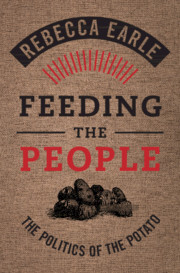Book contents
- Feeding the People
- Feeding the People
- Copyright page
- Dedication
- Contents
- Figures
- Recipes
- Abbreviations
- Introduction Pouring Ourselves a Large Gin
- Chapter 1 Immigrant Potatoes
- Chapter 2 Enlightened Potatoes
- Chapter 3 Free-Market Potatoes
- Chapter 4 Global Potatoes
- Chapter 5 Capitalist Potatoes
- Chapter 6 Security Potatoes
- Conclusions Parmentier, Peasants and Personal Responsibility
- Acknowledgements
- Notes
- Bibliography
- Index
Chapter 5 - Capitalist Potatoes
Published online by Cambridge University Press: 25 June 2020
- Feeding the People
- Feeding the People
- Copyright page
- Dedication
- Contents
- Figures
- Recipes
- Abbreviations
- Introduction Pouring Ourselves a Large Gin
- Chapter 1 Immigrant Potatoes
- Chapter 2 Enlightened Potatoes
- Chapter 3 Free-Market Potatoes
- Chapter 4 Global Potatoes
- Chapter 5 Capitalist Potatoes
- Chapter 6 Security Potatoes
- Conclusions Parmentier, Peasants and Personal Responsibility
- Acknowledgements
- Notes
- Bibliography
- Index
Summary
Potatoes were deeply embedded in nineteenth-century arguments about the merits of capitalism. The potato’s contested status emerges clearly in discussions about Ireland. In the eighteenth century, the potato’s contribution to the Irish diet had been viewed positively, because it enabled population growth. By the mid-nineteenth century it had become both an alarming illustration of the perils of economic autarky and a testament to the evils of capitalism. Commentators on all sides of the debate agreed that the potato encapsulated something of capitalism’s essence. At the same time, as urbanisation and industrialisation advanced, the conviction that the population’s eating habits had a material impact on the body politic only deepened. The new language of nutrition provided a vocabulary for expressing this relationship. From the mid-nineteenth century the potato’s growing importance within the working-class diet attracted the worried attention of nutritionists and statesmen, who condemned the effects of ‘lazy potato blood’ on the working body: the potato’s popularity with workers was blamed for lacklustre economic growth. Talking about potatoes provided a way for working people, scientists, economists and politicians to discuss the enormous changes that were reshaping nineteenth-century Europe in ways that stressed the close connections between economic practices and everyday eating habits.
Keywords
- Type
- Chapter
- Information
- Feeding the PeopleThe Politics of the Potato, pp. 140 - 167Publisher: Cambridge University PressPrint publication year: 2020

